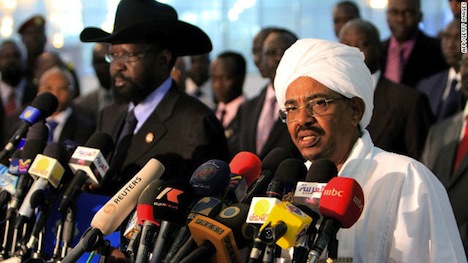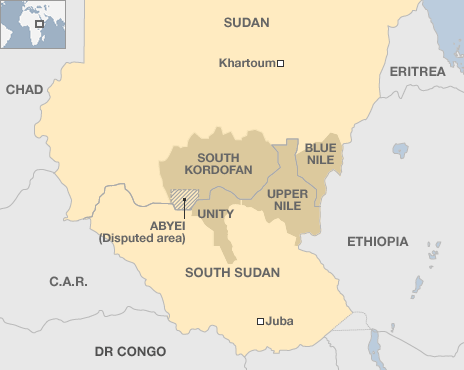Even as the government is allegedly calling for a ceasefire, the capital of South Sudan, the world’s newest country continues to teeter on the brink of civil war.![]()
![]()
The political differences between South Sudanese president Salva Kiir and former South Sudanese vice president Riek Machar, which far outdate South Sudan’s independence, now threaten to destroy South Sudan’s fragile institutions, including its armed forces and the independence movement-turned-political party Sudan People’s Liberation Movement (SPLM) into dueling factions. Last week, fighting broke out in the streets of Juba after Kiir announced that Machar tried to mount a coup against him — Kiir dismissed an increasingly critical Machar as vice president in July 2013.
The key for South Sudanese leaders is to keep what remains mostly a fight between dueling elites from crossing the political equivalent of the blood-brain barrier — transforming into a wider conflict based on ethnicity. With reports of mass graves of Nuer victims and fighting that’s spread from Juba to the majority of South Sudan’s ten states, crossing that barrier will become increasingly easier.
I wrote last week that South Sudan isn’t destined for civil war between Kiir’s Dinka ethnic group and Machar’s Nuer ethnic group, and I outlined steps that could ameliorate the situation — regional moves like South Sudan’s admission to the East African Community or an African or United Nations peacekeeping force, as well as national steps that would include Kiir’s reinstating Machar to the vice presidency, creating stronger checks and balances to the presidency and establishing a firm timetable for 2015 elections.
But the best incentive that the South Sudanese have in avoiding a civil war is the most obvious impetus of all — the winner of a South Sudanese civil war would be neither Kiir nor Machar, but Sudan, the country from which South Sudan split after a half-century independence struggle. If South Sudan’s leaders continue to turn on one another, you can be sure that Khartoum will take advantage of it.
That’s all the more devastating for South Sudan because so many issues remain unresolved following South Sudan’s 2011 independence. Those issues include financial matters like how to allocate Sudan’s pre-2011 national debt as between Sudan and South Sudan, but it also includes trickier aspects like territorial disputes and difficulties over sharing oil wealth that comes largely from wells in Unity state in the north-center of South Sudan and Upper Nile state in the northeast. There are reports that rebels loyal to Machar now control Unity state, oil production of around 45,000 barrels per day has now ceased in Unity state, and Machar loyalists also says they control Malakal, the capital of Upper Nile state. South Sudan’s government, as well as its economy, overwhelmingly depends on oil sales, so if the turmoil is starting to affect output, the conflict is reaching yet another critically damaging stage.
Meanwhile, the status of Abyei, a region immediately west of Unity state, remains disputed by both Sudan and South Sudan. It’s not difficult to imagine that Omar al-Bashir (pictured above, right, with Kiir) could take advantage of a drawn-out civil war in South Sudan by moving to take control of Abyei, despite the latest indication that the vast majority of Abyei’s residents preferred in an October 2013 non-binding referendum to become part of South Sudan. Abyei’s fate is connected to a revolt in South Kordofan, a state that lies just north of the Sudan-South Sudan border — while both countries agreed that it would remain under Khartoum’s administration, many of its inhabitants identify with South Sudan, and Bashir has been engaged in a two-year local rebellion to retain control of South Kordofan. Continue reading Who would win a South Sudanese civil war? Khartoum.

